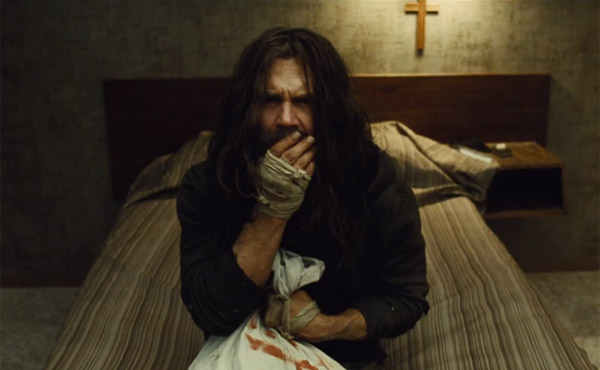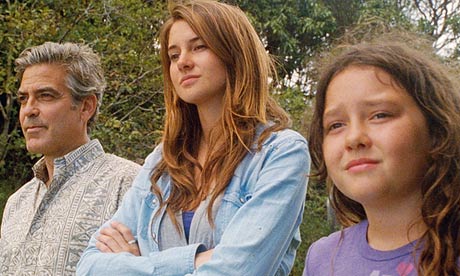 |
| Image via Buzzsugar |
Watching a director who has always directed their own writing suddenly bring somebody else’s vision to life is always interesting. “Nebraska” marks the first occasion that Oscar winning writer Alexander Payne has directed a screenplay written by somebody else. Maybe the fact that it takes place in his beloved home state helped out a bit.
“Nebraska” marks Payne’s first foray back into his home territory since 2002′s “About Schmidt.” However, it takes some time to get there. “Nebraska,” like “Fargo” and “Chinatown” before it, are about more than the setting that their titles suggest. “Nebraska begins in Billings, Montana, the current home of the Grant family. Woody Grant (Bruce Dern) is the patriarch of the family, whether he is aware of it or not. Woody is a sad man living a sad life. He walks with a slouch and acts like he never wasted any potential because he never had much to begin with.
Yet, Woody finally has some big ambitions. While he won’t trust the postal service to mail out a letter for him, he trusts an ad from a magazine claiming that he won a million dollars. The catch is that he can only claim that money if he goes to Lincoln, Nebraska. Woody, an alcoholic who is too mild-mannered to speak too much and too nice to burden other people, tries to make the trek on his own two feet. The mission is crazy, but his son David (Will Forte) decides to drive his father to claim his “prize.” David knows there is little hope, but he wants that sweet father-son bonding time. Mainly though, he doesn’t want his life to become as stagnant as his father’s, which tends to happen when you’re selling electronic equipment in Montana.
Stagnant is probably the best word to describe what the film portrays. “Nebraska” inhabits a Middle America in which the people grow older, yet their beliefs never change. The world immediately surrounding them remains about the same in order to accommodate their consistent attitudes.
“Nebraska” is shot in black and white, which is funny because it also looks like a painting by Grant Wood or Edward Hopper. There is something very melancholy about the grey sky in Big Sky Country or the endless hay bales that line the highways that cut through Nebraska, yet there is also something defining and quite beautiful about it. I can’t quite pinpoint what it is, but it feels like a piece of Americana that we all need to get back in touch with.
“Nebraska” is a story that would not be as effective if it were told in any other time or in any other place. Alexander Payne and writer Bob Nelson are to Nebraska what Springsteen is to New Jersey: a sharp voice on the problems of their land. They have earned the right to say these things because they also get what makes the people tick. I could have mistaken half of these people for actual residents of Hawthorne, Nebraska, where the most important scenes of the film take place. Based on the lack of IMDB credits for many of the actors, it is possible that most of them were plucked from obscurity to play themselves.
Payne has always had a knack for getting the best performances out of his actors. Whoever he casts manages to live up to his bleakly funny vision of the world. In his first dramatic leading role, Forte manages to tailor his comedic chops splendidly for a much more serious performance. In everything from “Saturday Night Live” to “MacGruber,” Forte always underplayed and was so funny because he could deliver hilarious lines while playing it completely straight. In “Nebraska,” he manages to lead the way as a dramatic straight man, acting like he has it all together even when he actually doesn’t.
Main characters aren’t usually supposed to be this quiet, but Bruce Dern (father of national treasure Laura Dern) gives a show-stealing performance. He is funny and a little sad all at once and does so by using so few words. When he does speak, it often comes off as beautifully poetic revelations from a simple man (when visiting his now empty childhood home: “I’d get whipped if I came in here…guess I can’t get whipped anymore”). Dern plays Woody as an old man who is grizzled and bitter yet he has gone through so much that it just doesn’t bother him anymore. He is less oblivious than he is in a child-like state of ignorance. Expect a well-deserved Oscar nomination for Dern this year.
I wouldn’t be able to finish this review properly without mentioning June Squibb. As Kate Grant, Woody’s loud and pushy wife, she at first comes off as downright despicable. Then, with a little more time to talk, she suddenly becomes the hero of the story, and then Woody and Kate’s marriage makes a lot more sense. Also, the scene where she visits a cemetery is one of the funniest scenes in any movie that came out this year.
Overall, “Nebraska” is a road trip movie and a story of finding second chances in times when redemption seems impossible. It’s the holidays now. You will be spending a lot of time with your family. “Nebraska” is a reminder that “family” and “dysfunctional” naturally go hand-in-hand. Just as David is like Woody without even trying to be, family makes us who we are, sometimes in the strangest ways possible.
The MPAA Fails Again: “Nebraska” is rated R, solely for use of language. While the sex talks gets a little explicit once or twice, its more funny than sacrilegious. Come on, your grandparents have probably said worse things than June Squibb ever says here.
Another Note: Stacy Keach gets punched in the face a lot (also see: “American History X,” “Brooklyn Nine-Nine”).







